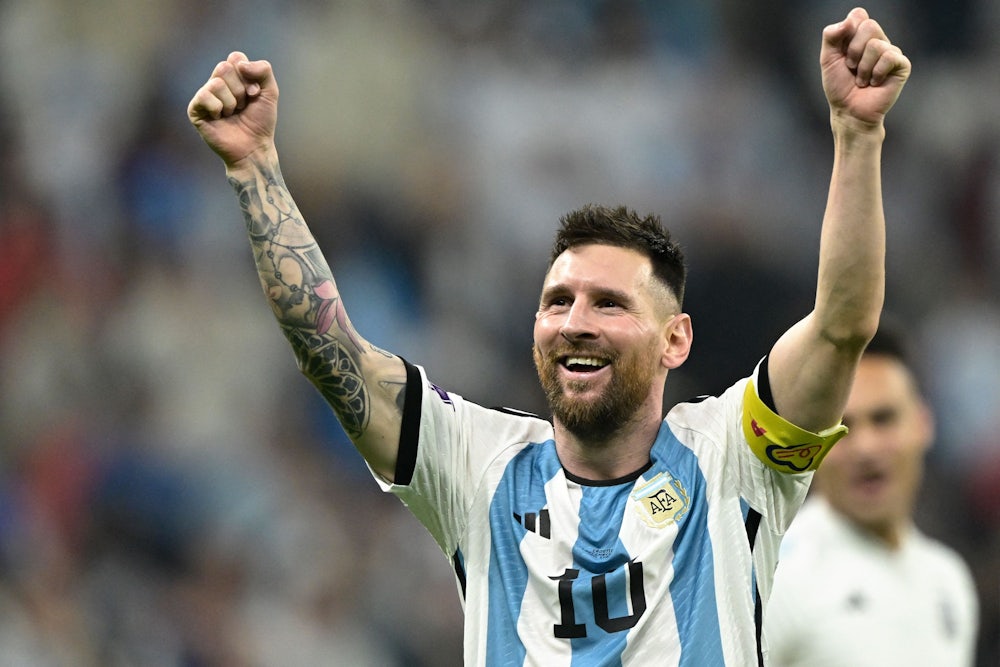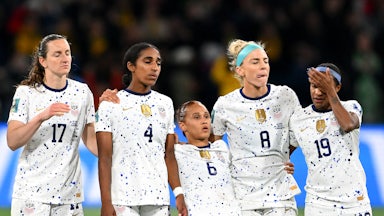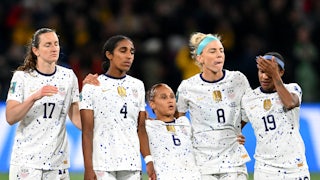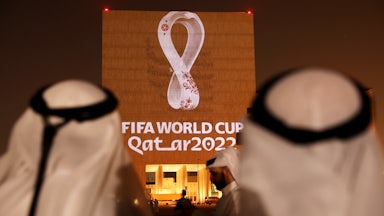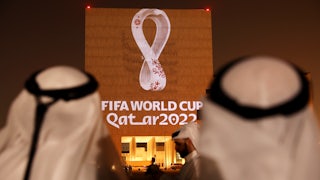There’s no other way of putting it: Qatar got the World Cup final it wanted. On Sunday, before tens of thousands of spectators in Doha—and hundreds of millions, perhaps billions, around the globe—two of the tournament’s best teams, Argentina and France, will face off. Not only that: The final brings together Lionel Messi and Kylian Mbappe, in a match that will serve as a symbolic handoff—the greatest player of a fading generation playing against the greatest of the rising one.
But there’s a seamier symbolism at work as well. For Qatar, this star-studded finale fulfills a gamble the country made more than a decade ago, when—amid a wave of bribery, shadiness, and the general skullduggery of FIFA, soccer’s governing body—it was awarded the World Cup. One year later, the Qataris bought French giant Paris St. Germain. Now Qatar will host a final in which two PSG players—Messi and Mbappe—face off. The system worked, for the corrupt host nation, at least.
A month ago, this outcome seemed far off. In mid-November, the Qatari state was in a near panic, having been buried under a tsunami of richly deserved negative press. After it had spent more than $200 billion to prepare for this World Cup—a figure that dwarfs previous expenditures—the discourse in the lead-up to the tournament largely revolved around the country’s atrocious treatment of the migrant workers who built its stadium, as well as the host of restrictions applied to women and LGBTQ people.
In part, this flurry of negative (and honest) coverage of the Qatar World Cup was a media make-up call: Four years ago, Russia, another country that should never have been awarded the tournament, received only a smidgen of negative press; the authoritarian crackdowns, as well as a brutal and illegal invasion of a sovereign nation helped to clarify that rosy coverage was a mistake not worth making again.
Qatar bristled under the pressure, even pushing FIFA’s president, Gianni Infantino, a man who seemingly becomes more of a Bond villain by the day, to do one of the most embarrassing press conferences in global history. “Today I feel Qatari,” he said. “Today I feel Arabic. Today I feel African. Today I feel gay. Today I feel disabled. Today I feel a migrant worker.” For sure, man. (On that point, when pressed by a reporter about the omission of more than half of the globe’s population, Infantino made a correction: “I feel like a woman too!”)
Here at the end, there is for spectators a feeling that is both elating and deflating: We too have gotten what we wanted. The 2022 World Cup has been if not quite extraordinary then very, very good. It has been chaotic, and at times it has defied belief. There have been transcendent moments—Japan’s comeback wins against Germany and Spain; Neymar’s goal against Croatia, the fact that Luka Modric is the only athlete in his late thirties who actually is aging like a fine wine—and a feast of very good ones. World Cups have always been more about moments than games, but this one has supplied plenty of both.
And while “chaos” in past World Cups has often been a euphemism for “sloppiness”—I’m thinking, in particular of 2002’s installment, which the cantankerous English sportswriter Brian Glanville described as “dramatic rather than distinguished”—the caliber of play here has largely been a cut above. With the exception of Qatar and two aging European quasi-powers—Denmark and Belgium—every team brought something. Morocco, the best story of the tournament by far, brought something extra. And two of the tournament’s best four teams ended up in the final.
I’m not sure anyone has really figured out how to cover this surreal and tragic winter World Cup. Most outlets have done what I and The New Republic have done: Mixed coverage of the various abuses and scandals that led us here with accounts of the often glorious play on the field and this tournament’s phenomenal sense of competition and technical excellence. This does not apply to Fox, which broadcasts the World Cup in the United States and has debased itself in countless ways, not only airing a relentless barrage of Qatari propaganda—while ignoring the wealth of evidence of human rights abuses associated with this tournament—but also subjecting viewers to what has been without question the most inane sports commentary in recent American sports history, an achievement in and of itself.
Perhaps the most consistently excellent coverage of this tournament was provided by Grant Wahl, who brought searing, warts-and-all coverage of what it was like to see this event up close without ever losing sight of the joy and beauty of soccer. Wahl, sadly, became one of those searing stories when he was felled by an ascending aortic aneurysm in the media center of Lusail Stadium as he was covering the Argentina-Netherlands match. We head now into a final that promises to be the capstone of an excellent, often extraordinary World Cup: a French juggernaut against a wily Argentine team led by the greatest player ever to play the game, a lion in winter. It is the kind of thrilling spectacle that Wahl taught thousands of readers how to love. It’s also exactly what Qatar hoped for.
Long before a single ball was kicked, this World Cup was suffused with an inescapable sense of finality. This was, in all likelihood, the last World Cup for Lionel Messi and Cristiano Ronaldo, the two greatest players not only of their generation but perhaps of all time; for Luka Modric, making a case, even at age 37, for being the greatest central midfielder of all time; for a host of other luminaries who have at least meant the world to their nations’ fans—Thomas Muller, Manuel Neuer, Robert Lewandowski, Eden Hazard, maybe even Brazil’s Neymar, who at 30 is a spring chicken but one buckling under the expectations of a country that has not won the tournament for two decades.
But there was a scent of renewal as well. France’s Kylian Mbappe was the breakout star of the last World Cup, becoming the first teenager since Pelé to score in the final; he has, in the subsequent four-and-a-half-years done everything he could to snatch the crown from Messi and Cristiano Ronaldo except play for a team in a competitive league. (He has, thanks to familial roots and the extreme wealth of the Qatari state, stayed put in Europe’s fifth-best league.) Alongside him were a host of players, most teenagers, vying for attention: Brazil’s Vinicius Jr., England’s Jude Bellingham, Spain’s slight wondertwins Pedri and Gavi, and Germany’s Jamal Musiala.
Watching these players as they battle to seize the torch or pass it with grace has produced moments of exceptional football and moving sportsmanship. In the manic flurry that forms the montage of the past few weeks’ matches, I remember 34-year-old Robert Lewandowski weeping after finally scoring his first World Cup goal. I recall Saudi Arabian fans jubilant after their team took down Argentina after scoring two majestic goals in a game no one expected them to win.
And no one will soon forget the extraordinary, heart-tugging images of fans across the globe celebrating Morocco’s improbable run into the semifinals. Particularly as global wealth has poured into the European leagues—and as, perhaps not coincidentally, European teams have hoovered up the last four World Cups—there has been a sense that the West had gained an insurmountable edge in global soccer. This World Cup was a reminder that this truly is not just a global sport but the global sport, as teams like Japan and Australia showed their quality.
And so we arrive at Sunday’s final, a clash of footballing titans. This has been a tournament that celebrates both the well-worn styles of play that footballing nations develop over time and the globalization that’s reshaping the game: More than ever before, teams rely on not just their global diaspora for talent but on global networks designed to locate and develop potential stars. We’ve also watch as these national teams have gotten much shrewder in how they press and counterattack— advancements learned from the work being done in sports’ top professional leagues—without any loss to their national identities.
The French team is, well, très français. There is an arrogance about them that befits both a defending champion that features the world’s best player and the French. They allow other teams to have the ball; at times it seems like they’re not really bothered that they too might need it at some point. And yet when it does, eventually, arrive in their penalty area, they defend tenaciously, if at times recklessly: Two of my favorite players in this tournament have been their young centerbacks who have been trading off in the starting lineup, Liverpool’s Ibrahima Konate and Bayern Munich’s Dayot Upamecano.
But there’s no way of getting around it: The arrogance is both earned and appealing. The French are exceptional and at times beautiful; Mbappe and his counterpart on the right wing, Barcelona’s Ousmane Dembele, are magicians. Olivier Giroud, the lumbering, paramountly un-French striker who is somehow the country’s leading scorer, is having the tournament of his life. Antoine Greizmann, perennially underrated, has been unquestionably the best player of this World Cup and has been unlocked by the team’s manager, Didier Deschamps, as—with the risk of mixing metaphors—a Swiss army knife. Deschamps has Greizmann, who is an attacking midfielder by nature, popping up everywhere: At one moment he’s snuffing out an attack from the opposition, in the next he’s spearheading France’s next upfield assault. No one—with apologies to Modric—has been a better passer.
And yet for all of that arrogance, they are also somehow underdogs as well. This is a team that has been hit harder than any other with injuries and is missing five players you could reasonably expect to regularly start, including three who started in the 2018 final (and another who would have if he hadn’t been embroiled in a years-long blackmail scandal that kept him out of the national team).
If the French never seem to expect that they’ll lose, even when they’re trailing, the Argentina squad they’ll be facing—along with fans of La Albiceleste—cultivate a deep anxiety even when things are going well. Some of this comes from what looks increasingly like a blessing in disguise: The 2–1 loss to Saudi Arabia in their opening game provided a wake-up call. But the constant fretting mainly just comes from being Argentine and not having won the tournament since Diego Maradona more or less conjured it out of thin air in 1986.
This anxiety still haunts their fans; you can often sense it in the stadium before they score or, more often, when they go down a goal. But this tournament has continued the slow collective exorcism of this nation’s footballing demons that began with their 2021 Copa America win. You can see it on Lionel Messi’s face with increasing frequency: He’s freed of the ghost of Maradona and critics who contended that he wasn’t Argentine enough to bring home the trophy.
In this tournament, by the way, he has been very Argentine. An avid soccer watcher, I rarely think of Messi speaking, let alone yelling. In this tournament however, he has spent a considerable amount of time barking at anyone around him: Referees, opposing players, coaches, his teammates. The anger is new, and he’s found a use for it. It rules.
He has also been the glorious and beautiful Messi we’ve always known. Never a particularly fast player, at 35 he plays much of the game at what could be charitably described as a trot. And yet, in this tournament he is still superb, putting opponents on skates seemingly whenever it suits him; before Tuesday, Croatian centerback Josko Gvardiol was arguably the tournament’s standout young defender. After Tuesday, the only clip that will be circulating of him is a man 14 years his senior putting him on his ass. But it’s no one-man band: Messi has been aided by what may very well be the best supporting cast he has ever enjoyed. That goes especially for 19-year-old striker Julian Alvarez, who may be stuck behind Erling Haaland at Manchester City but has been pure dynamism for Argentina. He too is starting to believe.
What makes this a great matchup is that the Argentine side is as Argentine as the France side is French. This is at times glorious and at times very frustrating: They often play a transcendent form of football; failing that, however, they like to kick opposition players. (But in a way that’s fun! Watching Leandro Paredes kick a ball at a benchful of Dutch players after committing an obvious yellow card offense on Nathan Ake may not be your thing, but if it is—this Argentine squad is for you. It certainly is for me.) Despite lacking the services of the injured Giovani Lo Celso, their midfield has put on a series of clutch performances. Rodrigo De Paul, in particular, has done such a fine job protecting Messi that calling him a mere on-field bodyguard doesn’t do him justice. He is the leader of Messi’s Praetorian Guard; he is the type of loyalist you would expect to be walled up, still breathing, with a deceased king thousands of years ago.
What will happen in Sunday’s final? I am famously bad at predictions. The ones I’ve made during this tournament have been, somehow, even worse than I usually expect them to be. My pre-tournament bracket had Brazil and—I’m sorry—Denmark squaring off in the final. I went on Morning Joe and said that the United States would definitely beat the Netherlands 2–1. I bet on Vinicius Jr., for some reason, to win the Golden Boot. I have no idea what I’m doing. If I’ve gotten slightly better at predicting the Nobel prize for literature, it’s obviously come at the cost of a steep erosion of my soccer nous.
Here’s a dirty little secret about World Cup finals: They can often be dull affairs. Even with all the talent on these two rosters, there is always the possibility that they will conjure a dud. France is often happy to sit back and let its opponents have the ball as it balefully defends, content in the knowledge that its attackers will eventually conjure something out of nothing. Argentina has gotten better as this tournament has gone on, but they’re not quite a well-oiled machine; they’ve been the tournament’s fourth-best team, behind Brazil, France, and England. And yet it’s hard to escape the fact that this final is a fitting capstone, regardless of what happens, for what has been one of the better tournaments in recent history. I will be cheering for it. So will the Qataris who bought it.
